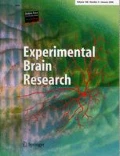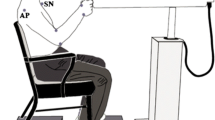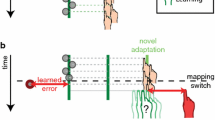Abstract
We have studied the effect of rest breaks on sensorimotor adaptation to rotated visual feedback in a pointing task. Adaptive improvement was significantly poorer after 1-s breaks than after 5–40-s breaks, with no significant difference among the latter break durations. The benefit of >1-s breaks emerged soon after the onset of adaptation, and then remained steady throughout the adaptation, retention (next day), and persistence (no feedback) phases. This pattern of findings indicates that break-induced facilitation is not a result of strategic adjustments, motivation, or recovery from fatigue, but rather to consolidation of previously acquired sensorimotor recalibration rules.

Similar content being viewed by others
References
Choe C, Welch R (1974) Variables affecting the intermanual transfer and decay of prism adaptation. J Exp Psychol 102:1076–1084
Dewar R (1970) Adaptation to displaced vision—the influence of distribution of practice on retention. Percept Psychophys 8:33–34
Ebbinghaus H (1885) Über das Gedächtnis: Untersuchungen zur experimentellen Psychologie. Duncker & Humblot, Leipzig
Genoux D, Haditsch U, Knobloch M, Michalon A, Storm D, Mansuy I (2002) Protein phosphatase 1 is a molecular constraint on learning and memory. Nature 418:970–975
Ghez C, Krakauer J, Sainburg R, Ghilardi M-F (1994) Spatial representations and internal models of limb dynamics in motor learning. In: Gazzaniga M (ed) The cognitive neurosciences. MIT, Cambridge, pp 501–513
Glenberg A (1979) Component-levels theory of the effects of spacing of repetitions on recall and recognition. Mem Cognit 7: 95–112
Kohler I (1955) Experiments with prolonged optical distortions. Acta Psychol 11:176–178
van Laer E (1968) Transfer effects in adaptation to prismatic displacement. Psychon Sci 13:85–86
Lee T, Genovese E (1988) Distribution of practice in motor skill acquisition: learning and performance effects reconsidered. R Q Exerc Sport 59:277–287
McNay EC, Willingham DB (1998) Deficit in learning of a motor skill requiring strategy, but not of perceptualmotor recalibration, with aging. Learn Mem 4:411–420
Redding G (1996) Adaptive spatial alignment and strategic perceptual-motor control. J Exp Psychol Hum Percept Perform 22:379–394
Scharf M, Woo N, Lattal K, Young J, Nguyen P, Abel T (2002) Protein synthesis is required for the enhancement of long-term potentiation and long-term memory by spaced training. J Neurophysiol 87:2770–2777
Schmidt R (1971) Proprioception and the timing of motor responses. Psychol Bull 76:383–393
Shadmehr R, Mussa-Ivaldi F (1994) Adaptive representation of dynamics during learning of a motor task. J Neurosci 14:3208–3224
Stratton GM (1897) Vision without inversion of the retinal image. Psychol Rev 4:341–481
Taub E, Goldberg I (1973) Prism adaptation: control of intermanual transfer by distribution of practice. Science 180:755–757
Acknowledgements
This work was supported by the German Ministry of Research through DLR grant 50WB9942, by DFG grant BO469/8-1, and by the German–Bulgarian exchange grant 436BUL113/131/0-1. Responsibility for contents rests with the authors.
Author information
Authors and Affiliations
Corresponding author
Rights and permissions
About this article
Cite this article
Bock, O., Thomas, M. & Grigorova, V. The effect of rest breaks on human sensorimotor adaptation. Exp Brain Res 163, 258–260 (2005). https://doi.org/10.1007/s00221-005-2231-z
Received:
Accepted:
Published:
Issue Date:
DOI: https://doi.org/10.1007/s00221-005-2231-z




